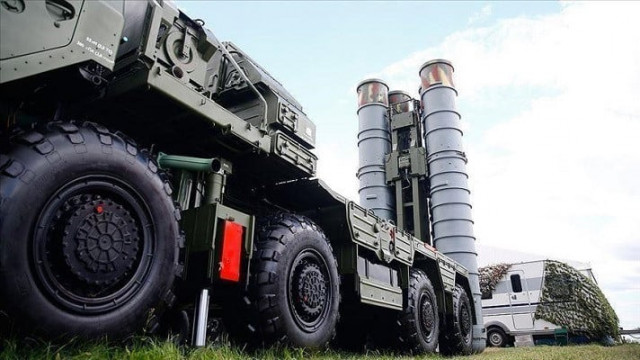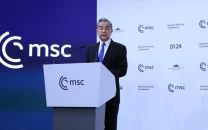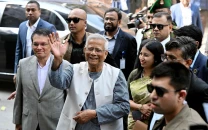'US may skip sanctions on India over Russian S-400 purchase'
Indian analysts hope the US will keep strategic interests in mind and avoid imposing the sanctions

Indian analysts hope that the US will keep strategic interests in mind and decide against sanctions in the wake of the country receiving $5.5 billion worth of the Russian S-400 missile defense system.
Indian Foreign Secretary Harsh Vardhan Shringla last week said supplies have begun this month and they will continue to happen.
The move has exposed India to the punitive actions under the Countering America’s Adversaries Through Sanctions Act (CAATSA), which was adopted by the US Congress to deter countries to buy military equipment from Russia.
Despite warnings by the US officials, India has moved ahead to buy the Russian arsenal and even hosted Russian President Vladimir Putin early this month in New Delhi.
Several security analysts and former diplomats told Anadolu Agency that they are hopeful that the government will be able to persuade the US against imposing any punitive measures.
Also read: Russia begins supply of S-400 defense system to India
Speaking to Anadolu Agency, veteran former diplomat Vijay Nambiar said India has a long defense relationship with the Russians
“We will reason out with others like the United States, that we will require this in light of our strategic interest. I don't think India is willing to accept veto from any outside power for these kinds of things which we judge, which are in our national interest,” he said.
A retired diplomat, who has also served as the UN secretary general's special adviser, Nambiar said India has explained its position to the US, and if actions come, the country will face them.
"India is hopeful that it (sanctions) will not happen, but if it happens, we will be willing to accept, we will face the thing if it happens,” he added.
Nambiar, however, hoped that India will be able to persuade the US to avoid imposing sanctions.
Workable relationship with India
He said the US was conscious of the fact that it needs a workable relationship with India and strengthening of relations should not affect the strategic autonomy of the country.
During his visit to India in March, Lloyd Austin, the US secretary of defense, had said that the allies and partners of the US should shun Russian hardware and “avoid any kind of acquisition that would trigger sanctions”.
After the announcement that India has started receiving deliveries of S-400, the US again reiterated its call on India to not move ahead with its purchase.
Also read: India, Russia strike trade, arms deals during Putin visit
Another former diplomat, Rajiv Bhatia, said India is keen to go ahead with the Russian missile system to assert its strategic autonomy. He said the purchase also means that Russia has sent strong political signals in the region.
"It is a vast missile defense system, and our adversary China already possesses it, so by giving it to India Russia is not only helping India but sending a very important political signal," he said.
Arguing that it is now for Washington to work out its approach, Bhatia said India "is hopeful that given strategic considerations, the US will take a realistic view”.
He said the expectation in India is that the US administration will give full weight and consideration to the strategic aspects and take a realistic view of the purchase of India.
Preferential treatment
In 2019, the US had provided a rare exemption to India from sanctions to develop the strategic Chabahar Port in Iran. Many attributed it to the US preferential treatment to India.
Indian experts, however, maintain that it is not preferential treatment.
"India is not getting away with anything. India is pursuing its interest in a conscious and calibrated manner and India is banking on the same counsel to prevail in Washington. Looking at overall global strategy especially in India Pacific Region," said Bhatia.
Nambiar also said that it was not preferential treatment, but a better understanding of the specific needs of India. He also reminded that India is not a member of NATO.
The experts said there may not be any effect in the relations between India and the US or its alliance in the Asia-Pacific region in the form of the Quadrilateral Security Dialogue group (QUAD) consisting of the US, Japan, Australia, and India.
Former chief of the Indian army’s Northern Command, Lt. Gen. Deependra Singh Hooda, however, admitted that the S-400 procurement may put some pressure on the US and India ties.
Also read: Arms race and emerging global military trends
"Will the S-400 procurement put India-US ties under some pressure? Sure, it will, but both countries have to come to some understanding of what the future challenges are and whether they can come to a common view on how they are to be addressed. This will require a long-term view," he said.
Interest in S-500
Sameer Patil, a fellow at the Mumbai-based Gateway House, a think tank, said S-400 is an important piece of equipment that will be inducted into the Indian arsenal to strengthen India's defenses against the Chinese ballistic missiles.
"Plus, S-400 is also battlefield-tested equipment that will assure the Indian security establishment about its performance," he said.
He added that the deal has re-established the importance of the decades-old defense ties between New Delhi and Moscow.
On Monday, Russia's Sputnik News quoted Deputy Prime Minister Yury Borisov as saying: "India may become the first in line to buy Russian air defense system S-500 if it expresses such a desire after the Russian armed forces receive them in required quantity."
Experts in India maintain that it was the right of the government to decide about future deals.
"Whether it (deals between India and Russia) will stop or go on, it is governments to decide. All of what I say fundamentally is that this decision to go ahead with S-400, shows a realistic frame of mind in Delhi and this is very much complimented by friendly cooperative attitude on part of Moscow," said Bhatia.



















COMMENTS
Comments are moderated and generally will be posted if they are on-topic and not abusive.
For more information, please see our Comments FAQ